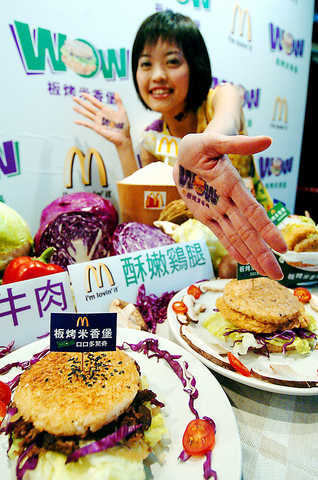After 18 months of research and development, McDonald's Restaurants (Taiwan) Co officially unveiled a new menu yesterday, making Taiwan the first nation to offer rice burgers under the golden arches.
Dubbed a marriage between Eastern and Western culture, the company is offering two flavors of toasted rice burgers, with a choice of either chicken or beef, which is sandwiched between two rice cakes.
The fast-food giant has in recent years hosted a series of health campaigns amid growing public worries over the high fat content of its food.

PHOTO: SEAN CHAO, TAIPEI TIMES
Healthier Menu Items
Aiming to convince consumers of its healthy message, McDonald's Taiwan said its research included meeting with 41 focus groups and interviewing over 3,000 customers to dish out the new products.
Other additions to the firm's new menu include clam soup and salads, seemingly sending a clear message that the restaurant chain is attempting to reverse its notorious image through offering more localized dishes and healthier food.
Company executives brushed aside suggestions that this was the case, however.
Obesity among Taiwanese males aged over 19 has been growing in recent years, Chu Nien-feng (祝年豐), a physician at the department of public health of the Tri-Service General Hospital, said at a press conference in December last year. The number of women with a waist size bigger than 80cm has reached 40 percent of the female population over the past 20 years, far higher than the 20 percent for males, he added at the conference.
Rice Strategy
The company also hopes its efforts can help to boost its penetration rate in rice-loving societies, McDonald's Taiwan's chief executive officer Steven Lee (
Deemed an important step to expand its market share at a time when more people are preferring to eat out, the company will use 15 to 20 percent of its annual marketing budget -- which stand at hundreds of millions of NT dollars -- to promote the new products, said Viya Chen (
Although not the first restaurant chain to offer rice burgers in Taiwan, McDonald's is confident the quality of its product can beat that of smaller competitors Mos Burger and 7-Eleven convenience stores, which started selling microwaved rice burgers in December 2003.
Giorgio Minardi, McDonald's vice president and chief marketing office for the Greater China region, said he expects to bring the products to other Chinese societies soon if the response here is encouraging.

Taiwan Semiconductor Manufacturing Co (TSMC, 台積電) secured a record 70.2 percent share of the global foundry business in the second quarter, up from 67.6 percent the previous quarter, and continued widening its lead over second-placed Samsung Electronics Co, TrendForce Corp (集邦科技) said on Monday. TSMC posted US$30.24 billion in sales in the April-to-June period, up 18.5 percent from the previous quarter, driven by major smartphone customers entering their ramp-up cycle and robust demand for artificial intelligence chips, laptops and PCs, which boosted wafer shipments and average selling prices, TrendForce said in a report. Samsung’s sales also grew in the second quarter, up

LIMITED IMPACT: Investor confidence was likely sustained by its relatively small exposure to the Chinese market, as only less advanced chips are made in Nanjing Taiwan Semiconductor Manufacturing Co (TSMC, 台積電) saw its stock price close steady yesterday in a sign that the loss of the validated end user (VEU) status for its Nanjing, China, fab should have a mild impact on the world’s biggest contract chipmaker financially and technologically. Media reports about the waiver loss sent TSMC down 1.29 percent during the early trading session yesterday, but the stock soon regained strength and ended at NT$1,160, unchanged from Tuesday. Investors’ confidence in TSMC was likely built on its relatively small exposure to the Chinese market, as Chinese customers contributed about 9 percent to TSMC’s revenue last

LOOPHOLES: The move is to end a break that was aiding foreign producers without any similar benefit for US manufacturers, the US Department of Commerce said US President Donald Trump’s administration would make it harder for Samsung Electronics Co and SK Hynix Inc to ship critical equipment to their chipmaking operations in China, dealing a potential blow to the companies’ production in the world’s largest semiconductor market. The US Department of Commerce in a notice published on Friday said that it was revoking waivers for Samsung and SK Hynix to use US technologies in their Chinese operations. The companies had been operating in China under regulations that allow them to import chipmaking equipment without applying for a new license each time. The move would revise what is known

UNCERTAINTY: A final ruling against the president’s tariffs would upend his trade deals and force the government to content with billions of dollars in refunds The legal fight over US President Donald Trump’s global tariffs is deepening after a federal appeals court ruled the levies were issued illegally under an emergency law, extending the chaos in global trade. A 7-4 decision by a panel of judges on Friday was a major setback for Trump, even as it gives both sides something to boast about. The majority upheld a May ruling by the Court of International Trade that the tariffs were illegal. However, the judges left the levies intact while the case proceeds, as Trump had requested, and suggested that any injunction could potentially be narrowed to apply